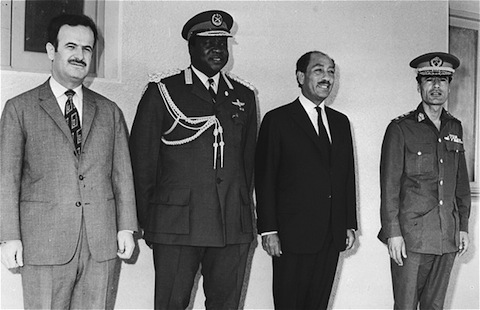
As Muammar Qaddafi continues to rage, rage, rage against the inevitable dying of the light, the time has come to assess just how much damage he wrought during his absurdly long rule. I never cease to be amazed by the man’s longevity; just recently, in fact, his name came up in my book research, as a man who was said to extend offers of hospitality to American fugitives. He briefly flirted with the idea of turning Tripoli into a North African version of Havana, a base of operations for on-the-lam radicals whose ability to escape justice might prove deeply embarrassing for the United States. But like many a megalomaniacal strongman, Qaddafi had an incredibly short attention span. Before he could set the wheels in motion on his anti-American plan, he moved on to another pet project: aiding the Irish Republican Army in its fight against the British.
Ultimately, this sort of half-baked approach to policy will be Qaddafi’s legacy. The man was big on concepts—albeit dastardly concepts—but laughably awful at follow-through. Uganda knows this well, based on Qaddafi’s lame attempt to prevent his pal Idi Amin’s overthrow in 1979. Libya sent plenty of troops to Uganda, to stave off a Tanzanian force bent on ridding its neighbor of Big Daddy’s murderous influence. But no one seemed to make any plans beyond simply loading the soldiers onto a Kampala-bound plane—which is why the bodes of so many Libyans now fill mass graves in Uganda:
The arrival of the Libyan desert commandos was as surprising as it was annoying because we had made it all along clear to Amin and the entire Army top brass that all we needed was artillery fire power to neutralise the enemy’s Katyusha and not the personnel. Communication was the biggest problem. They could neither communicate in English nor Swahili. Attempts to use Nubian which is more like broken Arabic hit a dead end because they could not understand the dialect. We resorted to communicating by hand.
“Another problem was in the dressing and the arms that the Libyan commandos opted to use. Their clothes were clearly not for jungle warfare. Instead of arming themselves with assault rifles like G3s and AK47s, they had light arms like Uzi guns and a wide range of machine pistols. We did not have any way of informing them that their clothes and arms were going to work against them, so we simply let them go to the front. They joined our forces that were waiting for the enemy in Kalisizo. The enemy descended upon the area in full force. The battle was hot for both our troops and the Libyans, who suffered because of their failure to comprehend withdrawal orders issued in Swahili.
The following morning when some of them came back to Masaka after the fall of Kalisizo, they were a sad sight. Some were dead and many of them were injured. It was a pitiful scene watching those who were lucky to escape without any injuries tearfully carrying their wounded and dead colleagues off their small trucks.
History does not seem to have recorded Qaddafi’s reaction to this slaughter. My guess is that by the time the news reached his ears, he had more-or-less forgotten that he’d ordered the mission in the first place.


Captured Shadow // Sep 8, 2011 at 12:24 pm
Wow, how awful for those soldiers. How much will the end of the cold war reduce despotism do you think. Or are there too many other forces keeping despots in power?
Brendan I. Koerner // Sep 8, 2011 at 9:02 pm
@Captured Shadow: I, too, pitied the soldiers when reading the description of their defeat. I’m sure they were just humble conscripts, shipped off to a country with which they were (at best) only vaguely aware. They really had no clue what they were in for–nor, ultimately, why they were being slaughtered.
You ask a tough question. The Cold War certainly allowed for despots to flourish, provided they were clever enough to exploit U.S.-Soviet tensions. Both sides supported their fair share of scoundrels, in exchange for not-so-sincere vows of fealty.
But the only real protection against despotism is the existence of inviolable institutions. And those have proven very hard to create in nations with little to no experience with the rule of law. On top of that, developed nations continue to turn a blind eye to despotism when it’s economically prudent. (See: Equatorial Guinea.)
All of this reminds me that I really, really need to get out and see that new Nicolae Ceausescu doc. It’ll be interesting to see whether his methods of control seem dated.
Jordan // Sep 9, 2011 at 5:59 pm
The fact that Obiang has been allowed to continue ruling that country more or less unmolested is just gobsmacking.
In the wiki page about him, it says that Forbes has listed him as one of the richest heads of state on earth, but his government complained that Forbes was counting state property as part of his personal fortune.
You can’t make up stuff like that.
Brendan I. Koerner // Sep 10, 2011 at 10:27 am
@Jordan: I first heard of Obiang by reading Robert Klitgaard’s Tropical Gangsters, an account of the author’s time as a World Bank official in Equatorial Guinea during the 1980s. I was floored to later discover that Obiang was still in power; the book portrayed him as both venal and dim, a man who seemed intent on keeping his nation’s populace as poor as possible. Really a tragedy that he has been able to cling to power for so long–and that he plans on handing down power to his equally repugnant son, who was recently robbed of $2.5 million at a luxury Swaziland hotel.